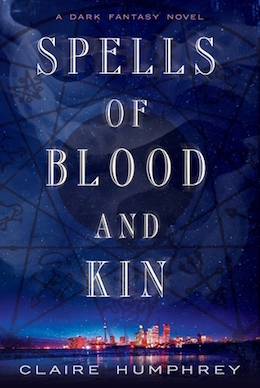Claire Humphrey already has something of a track record with short stories. Spells of Blood and Kin is her first novel, and as a debut, it’s an incredibly accomplished achievement.
When Lissa Nevsky’s grandmother dies suddenly, Lissa—twenty-two years old, with no other close family—inherits her grandmother’s position as witch to a Russian community in Toronto. Iadviga Rozhnata was a koldun’ia, whose spells brought fertility or healing or any number of other things. Lissa, grieving, shy, a perpetual outsider, never quite sure of herself, inherits something else, too: a problem in the form of Maksim Volkov.
Maksim was human once. He hasn’t been just human for a couple of centuries. A spell from Iadviga kept his violent nature leashed, the part of him that craves blood and savagery and breaking things apart, but with her death the spell has lost its hold. Already he’s lost control once, and infected a young man with his curse and the lust for violence that goes along with it. Without Lissa’s help, he may yet do worse: but Iadviga in life told Lissa nothing about Maksim. She doesn’t even know what he is—and Maksim is not very good at explaining.
Complicating all this is Nick Kaisaris, the feckless and irresponsible young man infected by Maksim, going slowly mad and getting increasingly more violent somewhere in Toronto. Maksim must find him before he hurts someone beyond repair. Also complicating Lissa’s life is the arrival of her younger stepsister Stella from London, ostensibly come to help Lissa after the funeral, but really fleeing a stalker ex-boyfriend and trying to rebuild her life. Stella doesn’t know that Lissa’s a witch, and Lissa doesn’t know what to do with a sister.
Spells of Blood and Kin is in many ways a quiet book, almost domestic. There are no villains—save perhaps Nick, who is young and stupid and out of control. All the novel’s conflict is between people and their natures, the parts of them they have to work at, or with, or against, in order to be the people they want to be and have the things they want to have in life. In some ways it reminds me very closely of Leah Bobet’s Above and An Inheritance of Ashes, books which are generous in their sympathy for their characters, and clear-eyed about their failings. Spells of Blood and Kin is not gentle, exactly, but it is vastly understanding of, and sympathetic to, human nature, even in its more monstrous aspects.
It’s also very atmospheric, and solidly rooted in Toronto, with a sense of place: a Toronto of multiple-generation immigrant communities and students, boxing gyms and bars and streetcars. Humphrey has a knack for description, a lovely turn of phrase, and some really great prose: in some of the sections from Maksim’s point of view especially, there is a sense of lowering dread and claustrophobia that works exceptionally well.
It takes a while to get going, though, and its measured pace and domestic intimacy might not suit every reader. But once it does, the emotional through-line—belonging, connections, the prices and compromises one accepts in order to live with other people, and with oneself: choosing or refusing to grow up—comes together in a deeply satisfying fashion. So too, the conclusion. It’s not every debut that can stick the dismount as well as Spells of Blood and Kin: but stick it the novel does, in a fashion that holds both pathos and inevitability, as well as a certain amount of triumph.
Humphrey has written a debut that I, personally, find exceptional. I look forward to seeing what she does next, because on the evidence? It’s going to be damn good.
Spells of Blood and Kin is available now from St. Martin’s Press.
Liz Bourke is a cranky person who reads books. She has recently completed a Ph.D. in Classics at Trinity College, Dublin. Find her at her blog. Or her Twitter.










